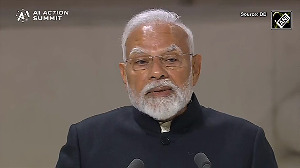The Supreme Court on Tuesday said it was not feasible to micro-manage cases of of mob lynching while sitting in Delhi and disposed of a plea raising related concerns, particularly cow vigilantism against Muslims.
A bench of Justices B R Gavai and K Vinod Chandran referred to the apex court's 2018 verdict which passed a slew of directions to provide "preventive, remedial and punitive measures" to deal with offences like mob violence and cow vigilantism.
"However, sitting here in Delhi, we can't monitor the incidents occurring in different areas in different states of the country. In our view, such a micro-management by this court would not be feasible," the bench said while disposing of the PIL.
The bench was hearing a PIL seeking directions to states to take immediate action in consonance with the 2018 verdict to effectively deal with incidents of lynching and mob violence, especially against Muslims by cow vigilantes.
It said the authorities were bound to follow the directions issued by the top court in the 2018 verdict.
"When directions are issued by this court, the same are binding on all the authorities and courts in the country in view of Article 141 of the Constitution of India," the bench said.
The apex court also dealt with a prayer for providing redressal in cases of lynching and mob violence to the victims, their families and strict compliance of the punitive and remedial measures mentioned in the 2018 verdict.
It said if there was any non-compliance with the directions issued by the apex court, there was remedy available for the aggrieved person and could approach competent courts.
Dealing with another prayer for a direction to the authorities to provide a minimum uniform amount as compensation for injuries caused to the victims of mob lynching, the court said, "Again, as to what could be an adequate and reasonable compensation would differ from case to case."
Citing an example, it said if a person suffered a simple injury and another one sustained serious injuries in such incidents, a direction to pay a uniform compensation would be unjust.
The plea seeking such omnibus reliefs would not be in the interest of victims, it added.
During the hearing, solicitor general Tushar Mehta, appearing for the Centre, referred to the 2018 verdict and said the top court had issued detailed guidelines.
"Now, under the new Bharatiya Nyaya Sanhita (BNS), mob lynching is a separate offence," he said.
The petitioner's counsel claimed there was "gross non-compliance" of the apex court's 2018 directions.
"If the issue is already concluded, can we again re-open it by another writ?" asked the bench.
Referring to the non-compliance of the apex court's directives, the petitioner's counsel said a pattern emerged across the states as appropriate steps were not taken by the authorities in such cases.
"In each state, the position would be different," the bench said, "are we going to decide upon the patterns?"
It referred to its verdict in a matter concerning demolition of properties and said liberty was given to aggrieved persons to approach the competent jurisdictional courts.
"Otherwise, sitting here in Delhi, can we monitor something which is happening in the northeast?" it asked.
The petitioner's counsel said they had also challenged the validity of some notifications issued by different states on the issue.
The bench said it would be appropriate that those aggrieved by these notifications approached the jurisdictional high courts to challenge the validity.
In July 2023, the apex court sought responses from the Centre and others on the PIL.
The plea sought urgent intervention of the apex court in view of the rise in cases of lynching and mob violence targeting Muslims despite clear guidelines and directions issued by the top court in 2018 with regard to cow vigilantes.
It underscored an "alarming rise" in such cases against the members of the Muslim community and sought an urgent relief saying states had failed to take necessary action against the perpetrators.
In 2018, the court held the states had a principal obligation to see to it that vigilantism, be it cow vigilantism or any other vigilantism of any perception, did not take place, and issued guidelines.











 © 2025
© 2025